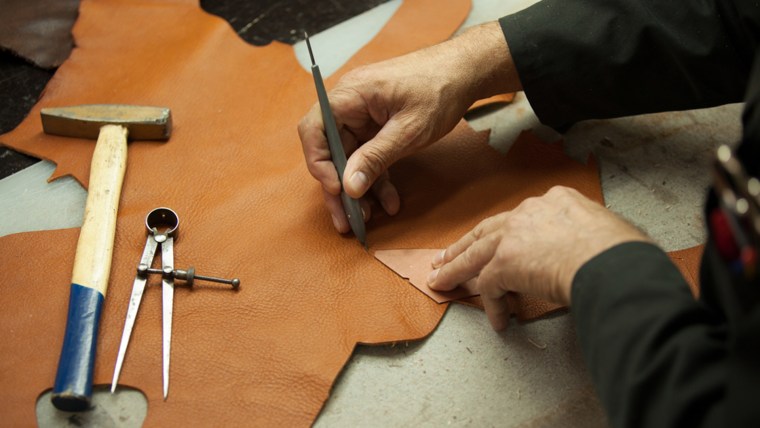One day there might be animal leather products that even vegans can get behind.
A Brooklyn startup called Modern Meadow is working to develop animal products — including leather — from cultured animal cells, an attempt to provide people the aesthetic of leather they know and love, but without the guilt.
“It’s a very exciting concept they’re working on,” Steven Lange, director of the Leather Research Laboratory at the University of Cincinnati, told TODAY.com. “I think it will have merit in the future, especially if meat consumption continues to decrease and the demand [for leather] continues to go up.”

One of the leather industry’s biggest problems is that supply doesn’t match demand — customers are cutting back on meat, and therefore less animal hides are available, but they’re not cutting back on purchasing leather. In fact, demand for leather has actually gone up recently, Lange said.
But while Modern Meadow’s product could one day help fill that gap, Lange doesn’t expect a cultured product to replace leather entirely any time soon.
RELATED: Scientists create test-tube burger with lab-grown beef
“I could see it more as a supplement,” he said. “Part of the appeal of leather is the variation, too. A lot of people even look for the natural markings in the hide, maybe a scar from when the animal lived. Also, when you handle the leather, how it bends, how it rolls when you touch it — I don’t know how leather made in a lab is going to do that. If you make every layer exactly the same, will it bend like that?”
It’s too soon to tell. Modern Meadow is still in its research and development stage and therefore declined an interview request with TODAY.com, but the company’s plans have nonetheless raised attention — and reportedly millions in funding. Their approach is to multiply muscle and skin cells naturally to create animal products like leather and cultured foods without actually slaughtering any animals.
The leather industry is often criticized for having a negative impact on the environment, from chemicals released during the tanning process to land required for livestock production, and even alternatives like pleather — “basically plastic,” Lange said — cause pollution. But leather grown in a lab would potentially require less land, energy and chemicals.
RELATED: Fashion gone viral: Clothing line funds research, fuels female scientists
Retail analyst Virginia Morris said the concept could catch on as more people shift toward a “vegan lifestyle” and care more about where their clothes and food come from, how they’re made and what effect their production has on the environment. Still, our love for leather isn’t waning.
“Think about all the things that leather is in — furniture, car seats, clothing,” Morris told TODAY.com.
She added that the probable uniformity of lab-made leather could even be beneficial in the fashion industry. Perhaps a laboratory would provide designers the freedom to specify the exact color or thickness of a piece of leather, for example.
Neither Morris nor Lange expect lab-made leather would have a huge effect on the product’s pricing — at least not yet. But eventually, it stands to reason that closing the supply-demand gap could lessen prices.
Lange suspects it will be a while before lab-made leather is up to par from an aesthetic standpoint.
“The density, the fibers, how it stretches — all that comes from the animal,” he said. “And I just don’t know how lab-made stuff is going to do that. Maybe in 15 or 20 years.”